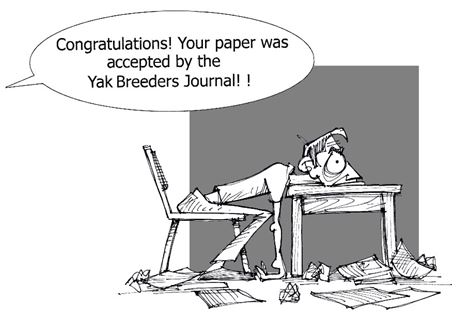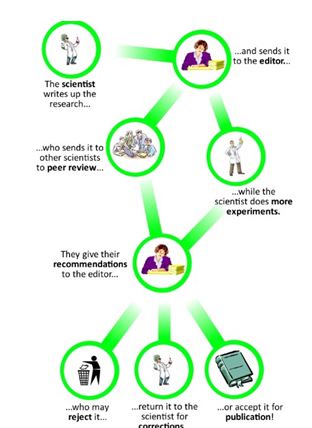Publishing
On this page
Why do academics publish?
What do academics publish?
Publishing a journal article
Writing
References
In an academic environment, publications are the most important formal means of communication. They are used to make research results public or to share an overview of the state-of-the-art in a research field. Publications and their citations are also used to determine researchers’ impact and, therefore, greatly influence their career opportunities. It’s important to know as a potential author how to choose the right publication type to influence it’s impact.
Why do academics publish?
For students, the reason for publishing is clear: it is a requirement for graduating. Researchers usually publish because they want to advance their particular scientific field and share their research results and knowledge with others, but also because they need to in order to progress in their careers.
See Impact to find out how the numbers of publications and citations are measured and analysed.
What do academics publish?
| Type of document | Author | What and why |
|---|---|---|
| Conference posters and papers | Researchers (sometimes Master students will contribute | First research results |
| Journal articles, reviews | Researchers (sometimes Master students will contribute | Overview of the “state-of-the-art” or further research results |
| Research data | Researchers (sometimes Master students will contribute | Data linked to publications, guaranteeing the transparency of the research and the reliability of the publications |
| PhD thesis | Reseacher | Full results of a PhD project |
| (Text)book | Reseacher | Overview of a subject (aimed at students) |
| Edited volume | Reseachers | Collection of articles by different authors who approach one subject or theme from different angles |
Publishing a journal article
Journal articles form the majority of scientific publications. Their format is quite fixed, because they are intended to quickly and clearly communicate information. Readers know what to expect and can easily find what the article is about, who wrote it, where the authors work and what literature was used during writing.
Selecting a journal
When publishing a journal article, you need to select a journal to submit your article to. This choice is based on:
- the scope of the journal: does your article fit in?
- the quality of the journal: what is its impact factor and are its articles included in well-known databases such as Scopus, Web of Science Core Collection?
- the policy of the journal with regards to peer review and Open Access: do you agree with their policy?
- the audience of the journal: who will be interested in your article?
Peer review is the review of an article by “peers” or equals: fellow researchers, who determine whether the article is good enough to be published.
-
Peer review is assessment by two or three fellow scientists. They give their opinions on the article in order to advise the editorial board whether the article should be published, perhaps after major or minor revision by the author.
The editorial board then decides that the article:- will be published unaltered
- will be published once the author has made the necessary minor improvements
- is not yet suitable for publication, but will be re-assessed after major revision by the author
- is rejected.
Many scholarly journals describe their peer review process on their websites. Sometimes, they include the proportion of submissions that are rejected. A rejection rate of 40-90% is common, so don’t take it personally, but use the feedback to improve your article.
Some journals offer an alternative to the traditional peer review process, such as an open peer review process where a submitted article is published before being reviewed and readers can add their reviews online.
Alternative peer review process Advantages Disadvantages It is more transparent. Authors may be put off by the public nature of the review. It allows authors to reply to comments and reviews and discuss their views with readers. Possibility of no reviews at all. Online discussions may lead to new insights. Possible reviews by uninformed readers.
In the traditional publishing model, publishers depend heavily on work performed by researchers for free: the researchers write the content of the journals, they peer review other researcher’s contributions and they work as editors. After all that work, their universities pay subscription fees to publishers to get access to the resulting journals.
From the 1990s onwards, an Open Access movement was started, which aims to make access to scientific information free for all. Universities in The Netherlands and abroad support Open Access.
-
Open Access publishing means that access to the information is free for readers. This has several advantages:
- Scientific information is available to countries and scientists with smaller budgets, not just to rich countries and scientists.
- Open Access boosts the impact of a publication. Wider access leads to more readers, and often can lead to more citations.
In an Open Access publishing model, the costs of publishing the material are paid by authors, their employers (universities) or funding agencies (organizations who fund research and research publications). Funding agencies increasingly demand that results are available as Open Access publications and they increasingly include a budget for Open Access publishing in their research grants.
There are two main versions of Open Access publishing:
- The “Gold” route, also known as “publishing Open Access”:
publishing in an Open Access journal or on an Open Access platform. This means that the publication is immediately freely accessible for the reader, because the author has paid for it. - The “Green” route, also known as “archiving Open Access”:
publishing in a subscription based journal or on a subscription-based platform, but including a final version of the publication in a university repository or on an Open Access platform. This means that it is freely accessible via a detour.
If you publish in a subscription based journal, publishers may ask you to sign a copyright transfer agreement before your work will be published. Negotiate about the possibilities to put your publication in a repository or on a website. On the SHERPA/RoMEO website and/or the journal’s website you can check the copyright and self-archiving policies of a journal or publisher.
TU Delft staff and students can add their publications to the TU Delft Repository.
TU Delft requires its researchers to publish in Open Access (i.e., at least the “Green” route). For more information about the TU Delft policy, see the Guidelines in the TU Delft Policy on Open Access Publishing.
Writing
For more information about writing go to:
- Scientific Writing Resource by Duke Graduate School to learn more about scientific writing.
- TU Write course in Brightspace which contains information and advice about writing.
- Academic Writing Assistant developed by the Leuven Language Institute from KU Leuven to check your language.
You can also contact The Writing Centre.
The Writing Centre is intended for bachelor and master students at TU Delft who need help with a writing task.
References
TU Delft. (n.d.). Open Science: manage your way to Open Science. Retrieved May 22, 2017, from http://openscienceguide.tudelft.nl
Why Open Research. (n.d.). Publish where you want [Image]. Retrieved May 22, 2017, from http://whyopenresearch.org/archiving

